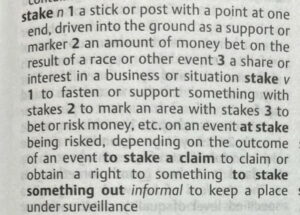 When you say you will “stake” £10 on something, it’s easy to know what it means. Bettors, and even those who don’t partake in gambling, understand that you’re placing a bet. You are making a wager.
When you say you will “stake” £10 on something, it’s easy to know what it means. Bettors, and even those who don’t partake in gambling, understand that you’re placing a bet. You are making a wager.
The stake can refer to the amount of money that you’re betting, or it can refer to the act of betting itself. This has become a common way for gamblers to refer to their betting activities. It is often used by poker players as well, relating to their bets. This word must have come from somewhere, though. It’s been around for some time now, but what are its origins?
How do we know today that it relates to gambling and betting? Did it go through any significant changes to reach that definition known today? Is there anything interesting about the word that explains its use as a gambling term? We’re going to take a look into the etymology, the definition and the history of the word ‘stake’. Here, we’ll discuss some further information on it and provide you with the details.
Definition and Other Meanings

The definition of ‘Stake’ is the amount of money risked or invested on something. This can be on the result of a race, a casino game our outcome in a sports match. A stake can also go by the title of a ‘wager’ and it represents the total investment in a given wager.
At the same time, the word comes into use when representing an investment in a particular project. This doesn’t have to be a monetary amount. It could be time, effort or anything else. The Cambridge English Dictionary offers up the following definition of the word:
Stake (noun)
A share or a financial involvement in something such as a business:
- He holds (= owns) a 40 percent stake in/of the company.
Stake (noun)
The amount of money that you risk on the result of something such as a game or competition:
- She spent two weeks in Las Vegas playing high-stakes blackjack at the casinos.
Stake (noun)
A strong stick or metal bar with a pointed end:
- The stakes are pushed or hammered into the ground and can be used for supporting a plant or forming part of a fence.
Stake (verb)
To risk an amount of money:
- At the roulette table, he staked $10,000 on number 21.
Stake (noun)
A share in something, esp. a financial share in a business, or an emotional investment in something:
- He holds a 20% stake in the company.
- Parents have a large stake in their children’s education.
The History of the Word

When it comes to gambling, we can dismiss meanings 1, 3 and 5 from this. With regard to the gambling versions of the word, this comes from the United States of America. In the early days of the country as it is today, land was very much desired.
Anyone who owned a part of the country was in a good position. The plots of land owned by each person had stakes put around their borders. This determined who owned what land. Where the stakes rested showed where one person’s land ended, and another’s began.
Yet in later years, the word ‘stake’ advanced to hold other meanings. In the 1520s, it was determined in the following way:
“to risk, wager, put at hazard or risk upon a future contingency”
A decade later, it was in use for different types of gambling. It also incorporated extra definition, namely:
“the sum of money or other valuable consideration which is deposited as a pledge or wager to be lost or won according to the issue of a contest of contingency”
Both the noun and verb version of the word are of uncertain origin, though. Some believe that it relates to “that which is fixed or put up”, coming from a particular use of it. Yet there is no evidence that such a custom existed relating to a post on which a wager was placed.
Relation of the Word to Poker
 If there is one word in the English language that ‘stake’ relates to more so, it is poker. While people can, and have, used it for referring to all types of gambling, poker stands out more. Two variations of the word relate to this game, with the first being the amount a player buys in for. It also refers to the amount that can be bet on a game of poker. There is something else that it can mean in poker too, though.
If there is one word in the English language that ‘stake’ relates to more so, it is poker. While people can, and have, used it for referring to all types of gambling, poker stands out more. Two variations of the word relate to this game, with the first being the amount a player buys in for. It also refers to the amount that can be bet on a game of poker. There is something else that it can mean in poker too, though.
‘Staking’ is the act of one person putting up cash for a poker player to play with. The hope is there with this act that the player will win the game. Any profits are then split up between the backer and the player. They will usually figure this percentage out before the staking takes place. A backed poker player of this type usually goes by the name of the horse.
Another term incorporating ‘stakes’ when it comes to poker is the table stakes. In poker, and in some other gambling games, table stakes stand out as a rule to take notice of. All players can bet no more money than the table stake in play. This limits the amount that a player can lose. At the same time, it limits the amount that other players may have to bet.
Table stakes usually relate to cash or ring games of poker, rather than tournament games. The intention of it is to level the stakes by creating high and low buy-ins. Table stakes is the rule in most cash poker games. Players with very different bankrolls thus have a reasonable amount of protection.
You may also sometimes see the term ‘nosebleed stakes’ utilised. This refers to the highest stakes offered within a cash game of poker. Generally, the blinds are at least $200/$400 for such circumstances to arise. This phrase comes about because nosebleeds can occur when you’re high up, so, it makes sense for nosebleeds stakes to define this type of poker game.
One final insight surrounding poker is the phrase “up the ante”. This relates to the stakes in play. When a player requests to “up the ante”, they want to increase the stakes.
Even though the word is often used to refer to poker games, this doesn’t begin and end there. It is a word that some people relate to placing a bet on any kind of gambling activity. If you engage in sports betting or casino gaming, then you may say that you’re “staking” an amount. This could be on a specific horse in a race for example, or on a spin of a slot machine’s reels.